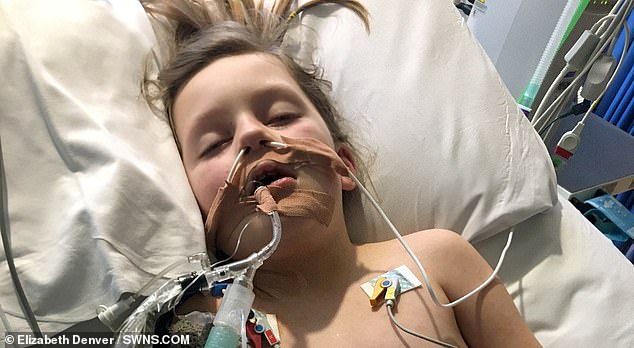Mother shares photo of her seven-year-old son in hospital
A mother has told how her six-year-old daughter nearly died after what she thought was chicken pox turned out to be a reaction to Covid that she did not know she had.
Millie Denvers, from Steyning, West Sussex, started to feel unwell on the evening of Saturday December 12 after three pupils in her class had chicken pox.
The six-year-old had a few spots, looked pale, started vomiting and had a fever with a temperature of 39.9 degrees.
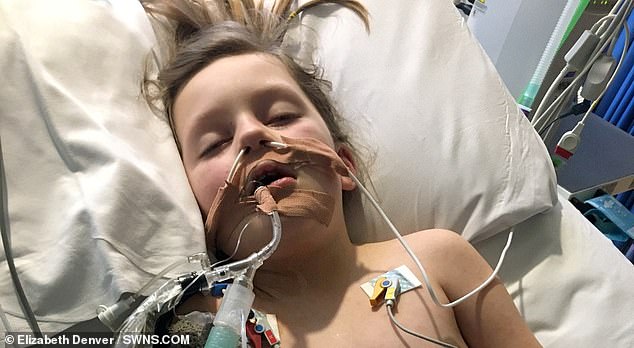
Millie Denvers (pictured in hospital), from Steyning, West Sussex, started to feel unwell on the evening of Saturday December 12 after three pupils in her class had chicken pox
The following Monday her temperature was back to normal but she was sleepy, not eating, suffering from sickness and crying in pain at night.
Mother-of-three Elizabeth Denver, 36, was concerned that the spots, she believed were chicken pox, were not blistering and called her GP on Tuesday morning.
Mrs Denver was advised to call for an ambulance and a paramedic advised to take Millie into hospital as there was a wait for an ambulance.
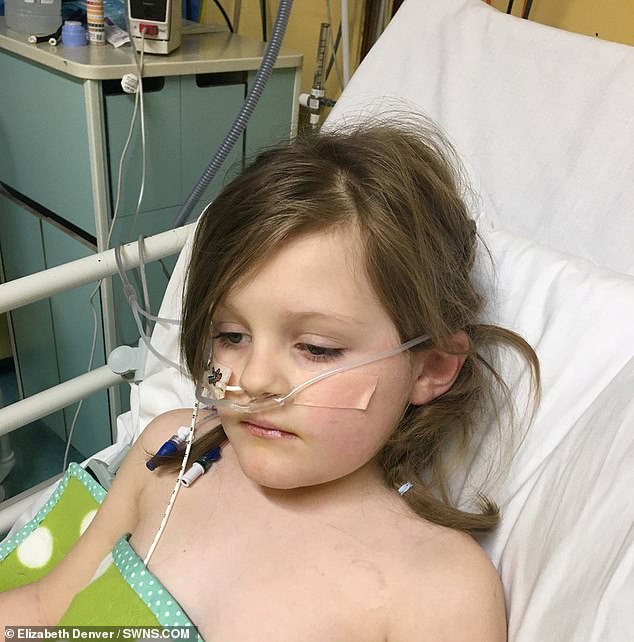
The six-year-old had a few spots, looked pale, started vomiting and had a fever with a temperature of 39.9 degrees
Millie was admitted to Worthing hospital around midday and transferred in an induced coma to Southampton hospital around 9pm on Tuesday December 15.
She remained in the coma for two days and her mother and father Glen Denver, 40, were told by staff at Worthing hospital that Millie had a condition called PIMS-TS.
The parents were told that the condition was a reaction to Covid-19 which she must have carried a couple of weeks before with no symptoms.
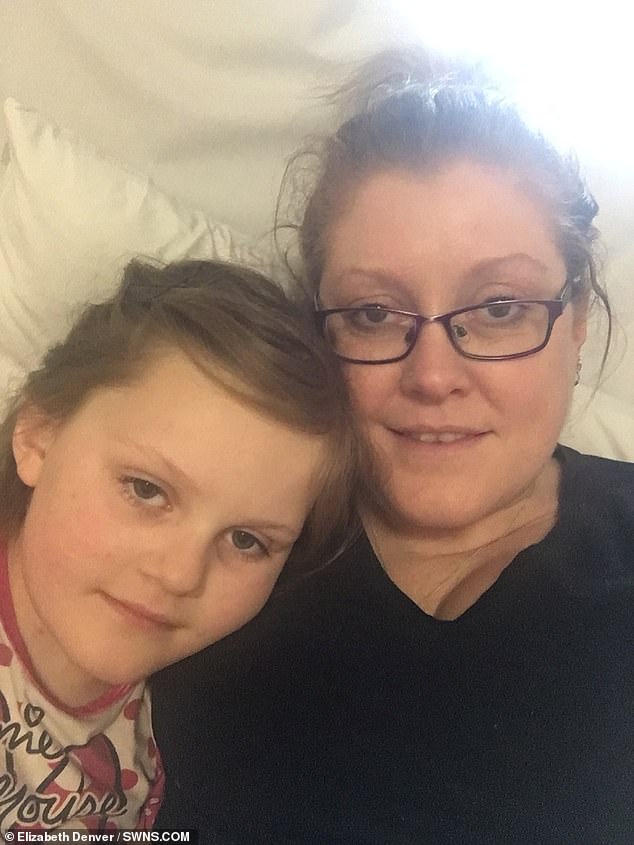
Mother-of-three Elizabeth Denver (pictured with Millie), 36, was concerned that the spots, she believed were chicken pox, were not blistering and called her GP
Mrs Denver said: ‘I was really freaking out. My mum is a nurse, and when I phoned her from the hospital to tell her what was happening she started crying, then I knew things were really serious.
‘Before they put her in the coma Glen asked if she could die, and the nurse said it wasn’t looking good but couldn’t actually say.
‘We had no idea she had carried Covid. Until she got sick on Saturday 12 she had been completely normal and she’s a really active little girl.
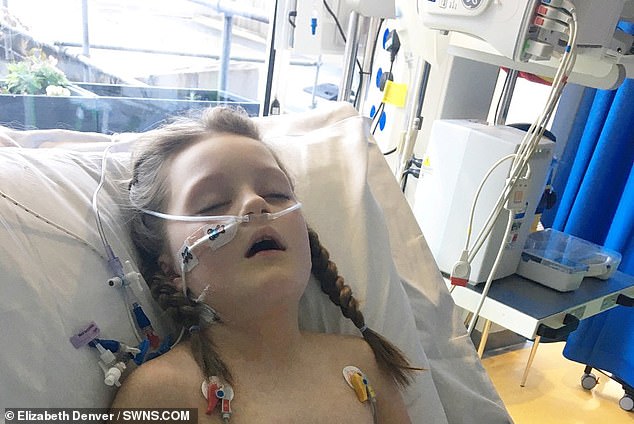
Blood tests revealed Millie’s liver and kidneys were struggling and she was on fluids within a couple hours of arriving at hospital
‘She had been going to school and doing everything she usually did.
‘All her symptoms were consistent with chicken pox, one of her sisters vomits whenever she has a temperature, but when the spots didn’t start blistering it worried me.
‘She was in so much pain in the car you couldn’t touch her. I had to carry her into the hospital and hold her up because she had gone all floppy.’

Mrs Denver explained that staff at Worthing Hospital could not make sense of Millie’s symptoms at first
Mrs Denver explained that staff
at Worthing Hospital could not make sense of Millie’s symptoms at first.
Her tongue had gone a thick white colour shortly before they arrived at the hospital, which is usually consistent with a throat infection, but her throat was fine.
Blood tests revealed Millie’s liver and kidneys were struggling and she was on fluids within a couple hours of arriving.
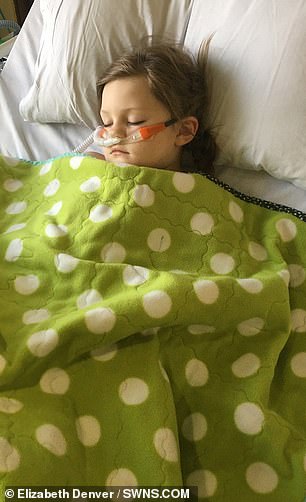
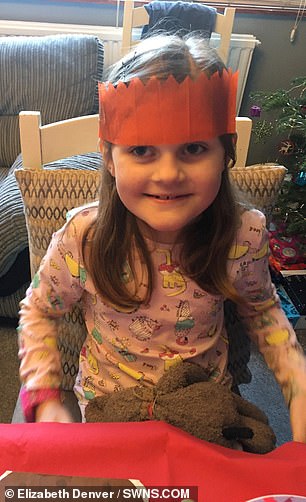
Millie in hospital (left). The six-year-old (right) was home for Christmas on Wednesday 23rd December and has recovered quickly and fully with the help of physiotherapy

Mrs Denver said: ‘It was a heartbreaking relief to hear her laughing with her (Millie, pictured) sisters on Christmas Eve
Mrs Denver said: ‘At first they could see that she had an infection somewhere but they couldn’t work it out. They hadn’t seen this before.
‘The PIMS-TS attacks all the organs and bone marrow, her kidneys were very damaged. Only five per cent of children who carry Covid get PIMS-TS.
‘Her heart rate was really high and they said South Hampton hospital were coming to collect her, to put her to sleep to give her organs a rest and help her body recover, and transfer her there, that’s when I called Glen to come.
‘When they transferred her she was asleep, with tubes everywhere, and strapped to a trolley.
‘My own heart was beating so fast and I felt sick, I couldn’t lose my little baby. I felt like I couldn’t breathe.
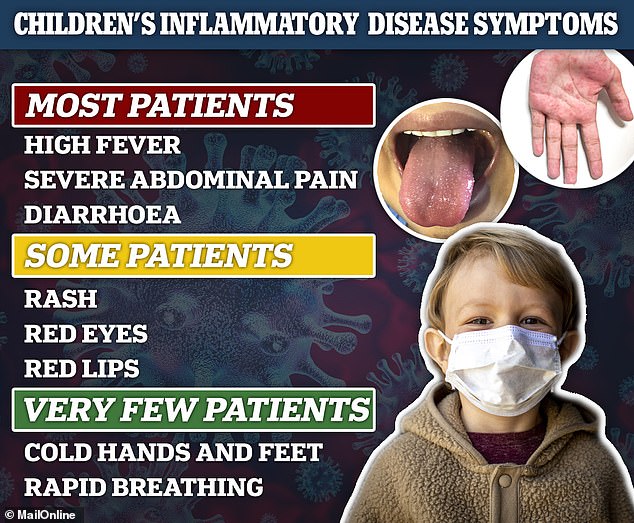
Children with the illness are usually taken to hospital with a high fever that has lasted a number of days and severe abdominal pain. The most seriously ill may develop sepsis-like symptoms such as rapid breathing and poor blood circulation
‘I wasn’t allowed to travel in the ambulance with her because of Covid, I just couldn’t deal with it, I needed to be with her.’
Mrs Denver stayed in Southhampton for eight days while Millie recovered and Glen looked after Millie’s sisters Elsie, nine, and Felicity, 12.
Mr Denver said: ‘I was worried sick and feeling useless at home. I just wanted to cuddle Elizabeth and my little baby.
‘You can’t cry when you’re on your own looking after two girls at home.’
Elsie and Felicity were scared their sister might die and missed Millie and their mother.
Mrs Denver said: ‘She loves to wind us all up, we call her the Millie Monster. Everyone missed that.’
Millie was able to breathe independently by Thursday night after they tried to wake her but her kidneys were still struggling and she didn’t wake properly.
She was moved to a high dependency unit for Friday, to a ward on the Saturday, and back to Worthing on the evening of the following Tuesday, December 22.
Millie was home for Christmas, on Wednesday 23rd, and has recovered quickly and fully with the help of physiotherapy.
Mrs Denver said: ‘It was a heartbreaking relief to hear her laughing with her sisters on Christmas Eve.
Worthing Hospital discharged her from their care on December 30 – it all started to sink in and I just sat and sobbed.
‘We walk past parks full of kids playing together. No one knows Covid can be so bad for them.’
It comes as a seven-year-old boy battled the same disease which left his skin covered in blisters and is thought to be linked to Covid-19 after he tested positive.
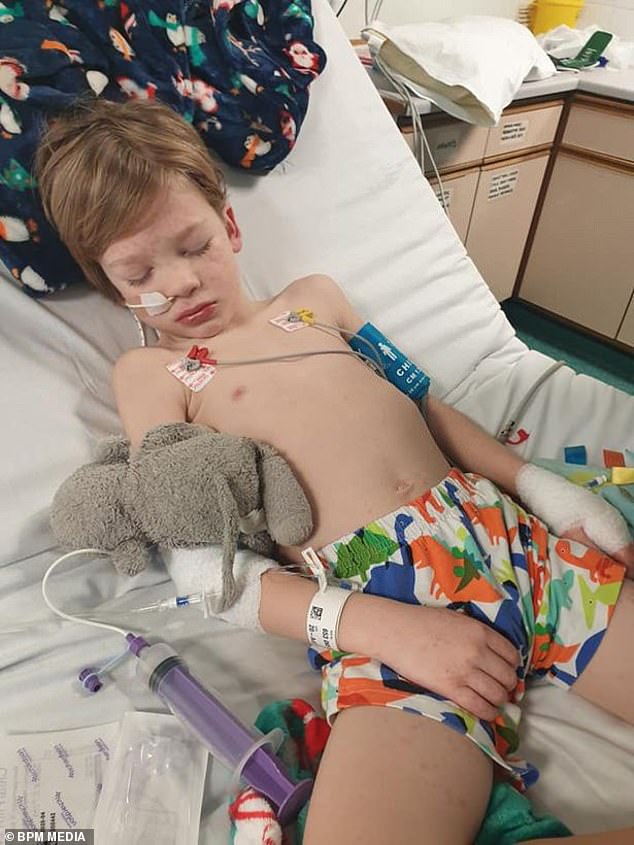
Seven-year-old Logan Walsh (pictured) battled the same disease which left his skin covered in blisters and is thought to be linked to Covid-19 after he tested positive
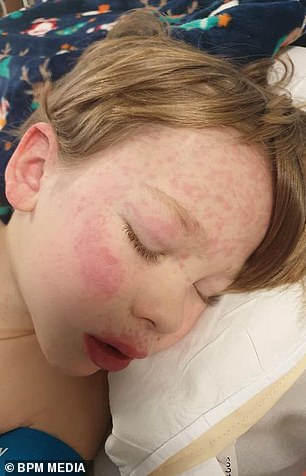
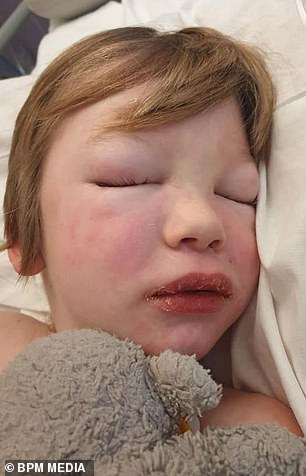
Logan (left and right) was diagnosed with the condition dubbed PIMS-TS which causes symptoms similar to sepsis, including a rash and high temperature
Mother-of-three Jessica Walsh, 43, and her sons, from Leeds, both contracted coronavirus in November but Logan did not show any symptoms.
However six weeks later Jessica was forced to call 999 after Logan began to vomit and had a fever which worsened in December and left his hands and feet swollen.
Logan was diagnosed with the condition dubbed PIMS-TS which causes symptoms similar to sepsis, including a rash and high temperature.
Jessica revealed how she called her GP and explained Logan had been sick for three days in what they thought was a ‘stomach bug’ and was worried about dehydration.
The mother was advised to call an ambulance and Logan was checked over by paramedics who were concerned that the boy had not urinated for over 12 hours.
Logan complained of a ‘headache’ and said he was ‘hurting’ the following day which led to Jessica calling 111 before she was told to take him to A and E.
Speaking on Facebook post, Jessica said: ‘I grabbed a few bits put him in the car and headed straight there with him, by the time we got there he couldn’t walk.
‘I carried him in and within the 15 minutes I waited to be taken through his hands and feet were swelling slightly and covered right up to the wrist and ankles in a bright red rash this was also appearing all over his face as I was watching him too.
‘They took him straight through and immediately had a few people checking him over but still at this point there was no mention of what was up with him.
She continued: ‘They moved us straight up to a ward where a specialist came to see him and this was the first time we heard ‘PIMS-TS’.
A specialist at Leeds General Infirmary said he had treated a lot of children with PIMS-TS and Logan was prescribed a steroid treatment.
Jessica added: ‘Basically they are seeing children and teenagers who have had
Covid- 19, and nearly always showing no symptoms when contracting it, coming in weeks later with this illness.
‘Sickness, diarrhoea, high temperature, a rash starting on hands and feet and then spreading, lethargic, headache, aching all over and abdominal pain are some of the symptoms.
‘It also attacks some of the organs, the heart been the main one.’
Logan also developed a heart murmur which caused his whole body to swell and his blood to start thinning.
Jessica said: ‘Logan is having a little physio and is just starting to walk again now but only a few steps and will be a while before he is running and going up and down stairs.’
‘I do believe if we had heard about it I would have insisted Logan was taken to hospital on the Wednesday and it wouldn’t have got so serious for him.’
She revealed how her aim is to ‘spread awareness’ of PIMS-TS so parents can act quickly if their child develops symptoms.
Jessica, who told how Logan made it home for Christmas, added: ‘He is on a mountain of drugs for a while and many appointments for scans, dieticians and cardio
‘He will take a long time to recover fully but hopefully he will get there eventually.’

